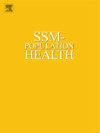社区聚会场所参与与社会资本:一项针对老年人的纵向研究
IF 3.1
2区 医学
Q1 PUBLIC, ENVIRONMENTAL & OCCUPATIONAL HEALTH
引用次数: 0
摘要
社会资本是政策制定者用来解决老年人健康挑战的共同干预目标。然而,社会资本干预的有效性的证据仍然明显缺乏。方法:采用纵向研究设计。我们使用了来自日本6025名老年人的三波数据(2016年、2017年和2019年)。我们评估了2019年的10项社会资本指标作为结果。暴露于2017年参与社区聚会场所。对2016年的暴露前特征和既往结局水平进行调整。根据结果的性质,采用线性回归分析和修正泊松回归分析。结果:社区聚会场所参与与9项社会资本指标正相关;与朋友见面的频率(B: 0.55)、一个月内见过的朋友数量(B: 0.49)、社区组织数量(B: 0.28-0.55)、互惠规范(B: 0.18)、依恋(B: 0.15);所有结果显示p1本文章由计算机程序翻译,如有差异,请以英文原文为准。
Participation in community gathering place and social capital: A longitudinal study of older adults
Introduction: Social capital is a common target of intervention used by policymakers to address the health challenges of older adults. However, evidence for the effectiveness of social capital interventions remain still clearly lacking. Methods: This study used a longitudinal study design. We used three waves of data (2016, 2017, and 2019) from 6025 older adults in Japan. We assessed ten social capital indicators in 2019 as outcomes. The exposure was participation in community gathering places in 2017. Pre-exposure characteristics and prior outcome levels in 2016 were adjusted. Linear regression analysis and modified Poisson regression analysis were employed according to the nature of the outcome. Results: Community gathering places participation was positively associated with nine social capital indicators; frequency of meeting friends (B: 0.55), number of friends seen within a month (B: 0.49), number of community organizations (B: 0.28–0.55), norms of reciprocity (B: 0.18), and attachment (B: 0.15); all results showed p1
求助全文
通过发布文献求助,成功后即可免费获取论文全文。
去求助
来源期刊

Ssm-Population Health
PUBLIC, ENVIRONMENTAL & OCCUPATIONAL HEALTH-
CiteScore
6.50
自引率
2.10%
发文量
298
审稿时长
101 days
期刊介绍:
SSM - Population Health. The new online only, open access, peer reviewed journal in all areas relating Social Science research to population health. SSM - Population Health shares the same Editors-in Chief and general approach to manuscripts as its sister journal, Social Science & Medicine. The journal takes a broad approach to the field especially welcoming interdisciplinary papers from across the Social Sciences and allied areas. SSM - Population Health offers an alternative outlet for work which might not be considered, or is classed as ''out of scope'' elsewhere, and prioritizes fast peer review and publication to the benefit of authors and readers. The journal welcomes all types of paper from traditional primary research articles, replication studies, short communications, methodological studies, instrument validation, opinion pieces, literature reviews, etc. SSM - Population Health also offers the opportunity to publish special issues or sections to reflect current interest and research in topical or developing areas. The journal fully supports authors wanting to present their research in an innovative fashion though the use of multimedia formats.
 求助内容:
求助内容: 应助结果提醒方式:
应助结果提醒方式:


